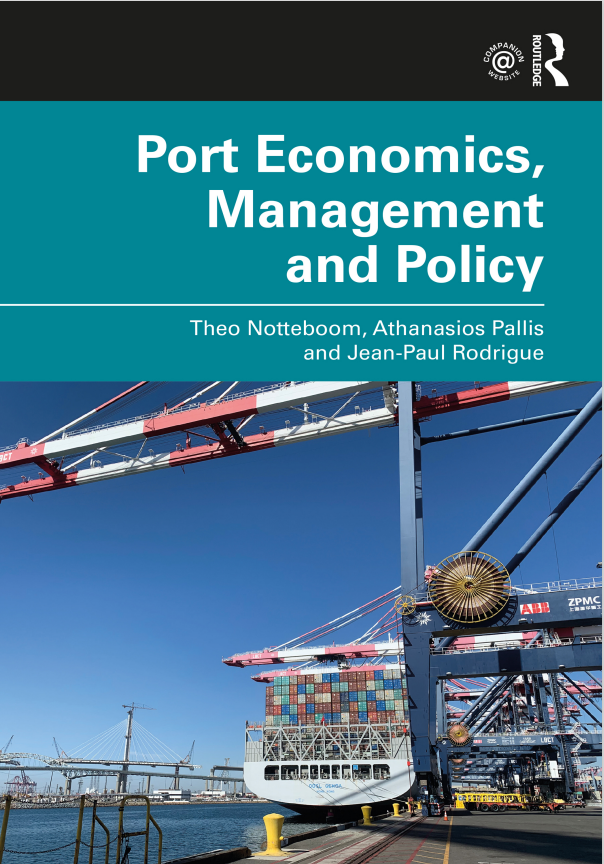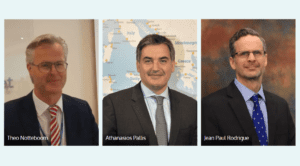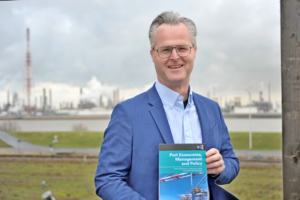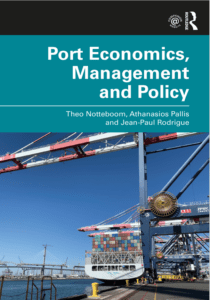In the past few months, Circular Flanders partnered with Theo Notteboom (Gent University/University of Antwerp/Antwerp Maritime Academy, Belgium), Athanasios Pallis (University of Piraeus, Greece), and Jean-Paul Rodrigue (Texas A&M University, Galveston, US) to focus on the potential and the role of ports in circular economy implementation and the impacts of the circular economy on seaport ecosystems. The outcomes have now been fully integrated as a new chapter in the freely accessible online version of the handbook Port Economics, Management and Policy.
The new chapter has been written for a wide audience ranging from students to practitioners and policymakers. The chapter will also feature in the second edition of the hard copy of the book, which is planned to be out at a later stage.
Not just another handbook
Port Economics, Management and Policy provides a comprehensive analysis of the contemporary port industry, how ports are organized to serve the global economy and support regional and local development.
This book examines a wide range of seaport topics, covering maritime shipping and international trade, port terminals, port governance, port competition, port policy, and much more. It uses a conceptual background supported by extensive fieldwork and empirical observations, such as analyzing flows, ports, and strategies and policies articulating their dynamics. The port industry is comprehensively investigated in this unique compilation that is abundantly illustrated with figures, graphs, and maps.
Benefitting from the authors’ extensive involvement in shaping the port sector across five continents, students, scholars, and policymakers can also use this as an essential guide towards better port management and governance.
The handbook Port Economics, Management and Policy has become the global leading reference work on all aspects related to seaports, and has been endorsed by leading port specialists from academia, international associations (IAPH, AIVP, FEPORT, ESPO, etc…) and port companies. – Co-author Thanos Pallis
The online version of the book had 280,000 visitors with 600,000 views in 2023.
Increased attention to circularity and ports
The circular economy presents a paradigm shift for seaports, transforming them into actors more actively involved in sustainability and resource management. By addressing the challenges and seizing the opportunities, seaports can establish themselves as vital contributors to a circular global, regional, and local economy, ensuring a more resilient and environmentally responsible future. Governments, businesses, and stakeholders must align to support ports toward sustainability and to reap the advantages of adopting circular economy mechanisms.
While the handbook provides a very comprehensive overview and analysis of all aspects relevant to contemporary port economics, management and policy, we felt there was room to further elaborate on some key issues affecting port ecosystems. One of the themes that needed a much more detailed analysis in the book is the circular economy and ports, which is now covered by the brand new chapter. – Co-author Theo Notteboom
At present, ports and governments are paying a great deal of attention to the energy transition, or even parts of it, such as hydrogen (flows, infrastructure). Circular challenges are still somewhat overshadowed, and the interactions between energy and circular transitions are not fully recognized. The transition to a circular economy is not something isolated or an add-on to sustainable development. It is also not just about improving the efficiency of the existing economic system, but a fundamental systemic change or transition to the next economy. These principles remain to be further tested and demonstrated.
Full-fledged circular economy chapter
Under the heading “Chapter 2.7: Ports and the Circular Economy”, the three authors developed an extensive analysis of the theme of (sea)port ecosystems and the circular economy, covering seven subsections: 1. Circularity and the Circular Economy; 2. The Circular Maritime Economy; 3. Ports as Hubs for Material Sourcing; 4. Port Land Management; 5. Energy Management; 6. Waste Management; and, 7. Strategies for the Circular Economy in Ports. The new chapter analyzes the current practices, development trends, challenges, opportunities, and initiatives adopted by seaports worldwide to transition toward a more sustainable and resilient future.
I am glad to have participated with Theo and Thanos (long-term collaborators colloquially known as the ‘Charthouse Group’) on this important addition to the textbook. The goal was not just to provide a synthesis of what already exists concerning the role of ports in a circular economy, but also about providing new concepts and ideas, including an actionable framework for ports. – Co-author Jean-Paul Rodrigue
As the Circular Economy theme is very dynamic, the new chapter will evolve further in the near future by enriching its content further with fresh conceptualizations and references to best practices in ports. As such, the chapter aims to keep on providing the latest updated insights on the notion of ports and the circular economy in a variety of contexts. The book’s accompanying website offers a lot of flexibility to the authors to adapt the handbook’s content to reflect trends, inflection points, and signals that new trends and developments in the context in which the circular economy might emerge.
Working with Theo Notteboom, Thanos Pallis and Jean-Paul Rodrigue is a very enriching and valuable collaboration. Taking advantage of opportunities on both sides, a full and accessible chapter on the topic of circular economy and port ecosystems was swiftly integrated into the online version of the book. We welcome this approach as it provides both an international reference and continuous updates for the benefit of port professionals, researchers and students. I look forward to the ongoing process of deepening the complex topic of circular economy and port ecosystems. – Walter Tempst (Circular Flanders)
The new content also benefits from the visibility of its results and dissemination via the international web initiative PortEconomics www.porteconomics.eu, as all three authors of the handbook are co-directors/leading members of this initiative since 2009.
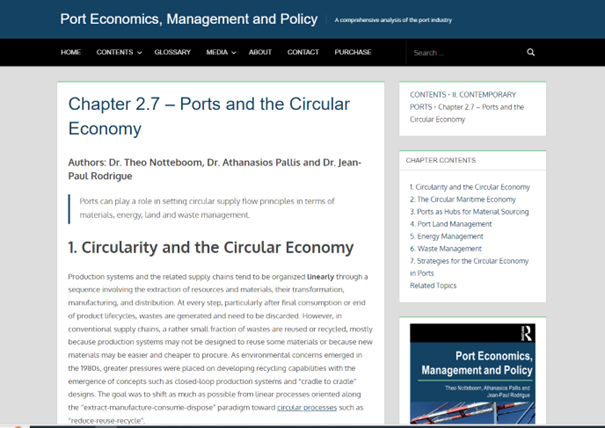
Check out Chapter 2.7 – Ports and the Circular Economy
Chapter 2.7 can be used as a textbook in universities and schools. But it can also be used by any active port professional who wants to have a broad basic knowledge of ports an d the circular economy.
The authors also know that the content is outdated even before it is published, so they also provide permanent online updates.
For more information, please contact
Circular Flanders info@vlaanderen-circulair.be
About
About the authors:
Theo Notteboom is Chair Professor ‘North Sea Port’ at the Maritime Institute of Ghent University and professor at the Faculty of Business and Economics of the University of Antwerp and the Faculty of Sciences of Antwerp Maritime Academy.
Athanasios Pallis is Professor in Ports and Maritime Economics and Policy at the Department of Maritime Studies, University of Piraeus, Greece.
Jean-Paul Rodrigue is Professor, Department of Maritime Business Administration, Texas A&M University, Galveston, US and Distinguished Fellow, Hagler Institute for Advanced Study at the same university.
About PortEconomics:
PortEconomics is a web-based initiative aiming to advance knowledge exchange on seaport studies. It provides freely accessible research, education, information, and network-building material on critical issues of port economics, management and policies.
About Circular Flanders:
Circular Flanders was appointed by the Flemish Government in 2017 to continue supporting the circular economy as a region-wide transition priority. The current Flemish Government (2019-2024) confirmed this mandate and expressed its ambition to make Flanders a circular frontrunner by 2030. Circular Flanders is not an institute, but a network of relevant public and private partners sharing circular challenges.
About Circular Ports:
Circular Ports is a product by Circular Flanders in support of port professionals, businesses and communities in the transition to a Circular and Low Carbon Economy. At Circular Flanders we have no ambition to be all-encompassing or to replace what the port community is already doing. We primarily provide practitioners with a useful selection of actionable insights and tools to support their journey towards a circular future. We don’t have all the answers either, but we create a context for learning, doing and finding lasting solutions.

